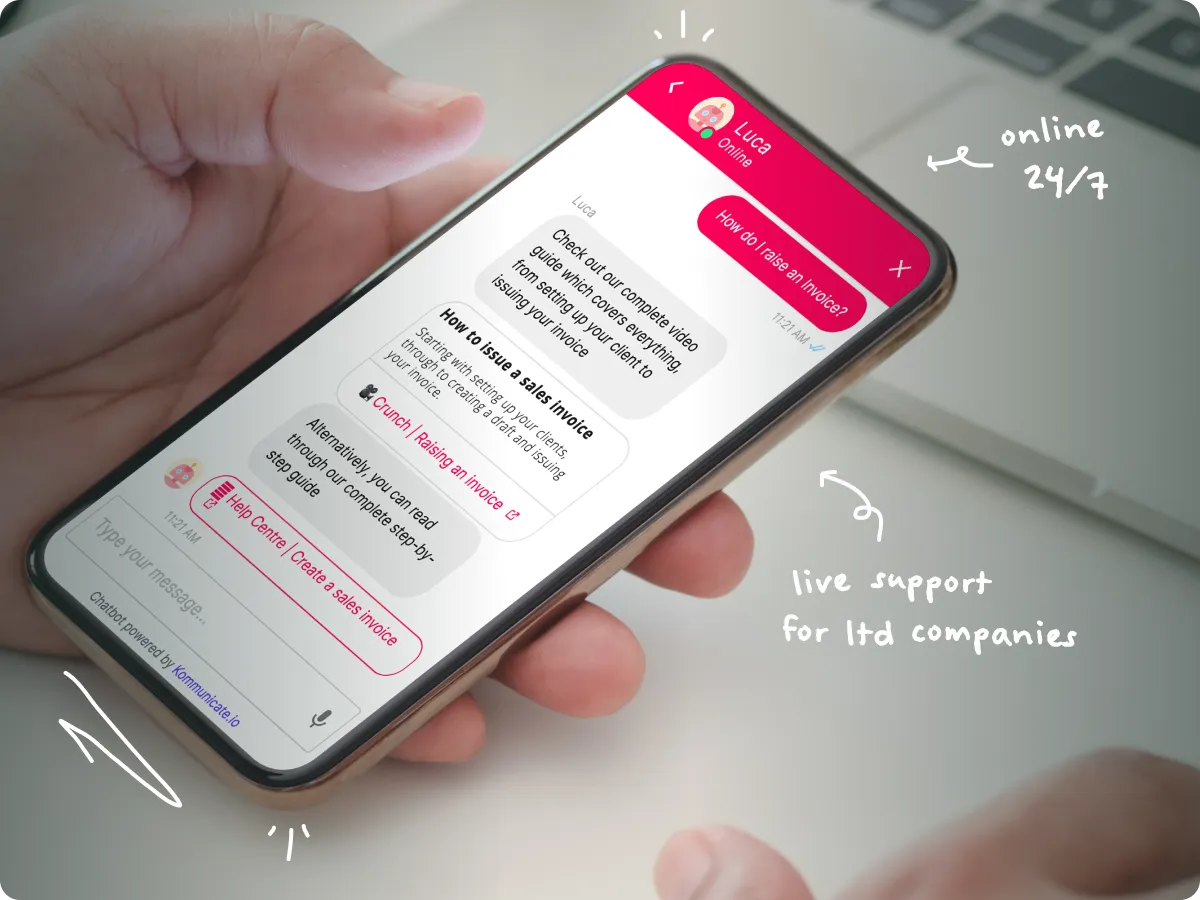For many people, January brings with it an important annual deadline - Self Assessment. By 31st January, those who qualify must file their Self Assessments with HMRC, with payments due the same day and again on 31st July.
With this in mind, it’s wise to put aside money each month to ensure you can pay your Self Assessment when the tax deadline arrives. But, sometimes, that’s easier said than done.
What if you can’t pay your Self Assessment bill? In this guide, we’ll explore how Self Assessment is calculated and, most importantly, what your options are if you are in this unfortunate situation.
Unlike in traditional employment, those who are self-employed or directors of a limited company typically have to pay Self Assessment twice annually. So, if you have come to self-employment from an employed role, you might not be used to organising your own tax, as it would previously have been removed from your income before the money hit your bank.
The pressures of the festive period can sometimes mean that January arrives and you find yourself without the funds you need to pay your Self Assessment bill, which is calculated based on your income for the previous tax year and minus any previous payment on account.
HMRC will place the following penalties upon those who fail to pay Self Assessment by the deadlines:
- 30 days — you'll have to pay 5% of the tax you owe at that date.
- 6 months — you'll have to pay a further penalty of 5% of the tax you owe at that date.
- 12 months — you'll have to pay a further penalty of 5% of the tax you owe at that date.
So, as you can see, late payments should be avoided at all costs - especially if you are already struggling to pay the existing bill.
Hindsight is 20:20, so by working with an experienced accountant like Crunch, you can accurately budget for your Self Assessment payments. But, if you’re currently facing a Self Assessment bill you can’t afford, then keep reading to find out more about your options.
Understanding Your Self-Assessment Tax Bill
Self-assessment is the name for the process of filling out and filing an SA100 form. An SA100 is an eight-page tax form that you must complete if you are eligible for Self Assessment. The form covers all forms of income, including director’s salary, dividends, interest, pensions, annuities and state benefits.
You can also include information about gift aid and charitable contributions to help calculate tax offsetting. And finally, the SA100 works to resolve issues around previous over or under-payments and tax refunds.
You must file an SA100 if you meet any of the following criteria:
- Self-employed
- Company director receiving income from non-PAYE sources
- Employed people with untaxed tips and commissions
- Landlords and let owners with rental or holiday let income
- People running side businesses
- High earners with over £100,000 in income
- People living in the UK earning income overseas
- Sellers who make taxable gains on asset sales
The Self Assessment tax bill is typically split over two payments, with one due on 31st January and the following on 31st July. Your tax is calculated by adding together all of your taxable sources of incoming and deducting any allowable expenses, available capital allowances and/or other allowances, and your personal allowance for the year. The relevant rate of tax is then applied to each income source.
If you are self-employed and profit over £12,570 in a year, then you will also have to pay Class 2 and Class 4 National Insurance.
- Class 2 - £3.45 a week
- Class 4 - 9% on profits between £12,570 and £50,270 & 2% on profits over £50,270
Directors of limited companies are considered ‘employees’ and must also pay National Insurance on annual income from salary and bonuses over £12,570.
To make sure you have correctly calculated your Self Assessment, including national insurance any other taxes, speak to the team at Crunch and make sure you get it right first time.
Payments on account
One of the most commonly misunderstood parts of the Self Assessment process is payment on account. If your total bill for Class 4 National Insurance and Income Tax exceed £1,000 per year, and you have not already paid at least 80% of your tax at source, then you will need to make a payment on account. A payment on account is essentially a pre-payment towards your future Self Assessment bill.
If your total bill for Income Tax and Class 4 National Insurance comes to over £1,000 a year, and you have not already paid at least 80% of your tax at source, your tax bill will state that you need to make a payment on account. This is one additional payment towards next year’s bill on 31st January, followed by another payment on 31st July.
Navigating financial difficulties: when you can’t pay on time
With the above in mind, there is a lot to consider when it comes to calculating your Self Assessment. Once you have a final figure owed, you will need to organise payment for your January payment, and ensure you have a plan in place to be able to meet your July payment.
So, what if you can’t pay on time? Whether you have failed to save enough money, or have incorrectly calculated your Self Assessment, there may be times when you find yourself unable to pay your tax bills on time.
If you are unable to pay your Self Assessment, you can ask HMRC for a Time to Pay arrangement which will allow you to split the debt into monthly payments. Time To Pay arrangements are calculated based on your personal circumstances, so there is no one-size-fits-all approach to this system. However, the HMRC typically won’t ask you to pay more 50 per cent of your disposable income.
If you think you may not be able to pay your Self Assessment bill on time, it’s critical that you speak to HMRC to organise a Time to Pay arrangement as soon as possible, as late payment without notification will result in charges. You can access this service by logging into the Online Time to Pay service and submitting an income and expenditure assessment.
Time to Pay is a flexible arrangement, which can be amended overtime depending on your earnings. According to HMRC, over 90% of Time to Pay arrangements are completely successfully.
Alternative payment strategies
While the Time to Pay arrangements are the primary option for those unable to pay Self Assessment, there are a few other approaches to this predicament you may want to consider.
For example, if you are employed, you can ask your employer to amend your tax code to incorporate the incurred tax and this will increase the tax paid each monthly to eventually cover what you owe.
If you fail to submit your tax return or submit late, HMRC can issue a determination, which is a formal calculation of the tax due plus a penalty. You then must file your tax return within three years of the due filing date or, if later, within 12 months of the determination date.
If you fail to file a tax return within this time, the tax charge raised by the determination stands, including any charges, penalties and interest. The raising of a determination should be avoiding where possible, as it will enable to the HMRC to commerce further formal proceedings to recover late tax in the future
Whatever your situation, speak to the team at Crunch to make sure you are choosing the right solution for you and help avoid any situations like this in the future.
Dealing with HMRC: Payment Plans and Contacting for Support
So, if you have any doubt about paying your Self Assessment, then a proactive approach is necessary to ensure minimal additional charges. Setting up a payment plan with HMRC can be done via your accountant or direct with HMRC via Time to Pay.
For Self Assessment taxpayers, you can set up a payment plan online if:
- The debt you owe is £30,000 or less.
- You do not have other payment plans or debts with HMRC.
- Your tax returns are up to date
- You contact them within 60 days of the payment deadline
If you don’t meet one or more of the able criteria, you will need to contact HMRC direct to determine whether you qualify for monthly instalments.
Understanding penalties and interest
In this guide, we’ve already touched on the risks of failing to file and/or pay your Self Assessment with HMRC. The biggest concern is the raising of interest and late payment penalties, which may make it even more difficult for you to pay your bill.
There is a late filing penalty of £100 if your tax return is up to three months late. If you file even later or if you fail to pay, there may be additional charges.
There is also interest against late payments. So, as soon as you realise you may not be able to pay your bill, you should speak to your accountant or contact HMRC via its online Time to Pay system.
HMRC also offers a penalty calculator for Self Assessment tax returns that are more than three months late.
You may be able to appeal against a penalty if you have a reasonable excuse. Browse a list of example “reasonable excuses” on the HMRC website.
Your rights and seeking advice
If you think you have been treated unfairly by HMRC, for example you don’t agree with Time to Pay calculations or feel strongly that you have a reasonable excuse, then you have the right to complain and/or appeal any HMRC decision.
To learn more about complaints and appeals, visit the HMRC website.
Unable to pay your Self Assessment? Get advice today
The best way to avoid the charges and stress of late payments is, of course, to pay on time. However, when this isn’t possible, you’ll need to take a proactive approach and make arrangements to pay in a way that works for both you and HMRC.
If you are worried about paying your Self Assessment, then don’t hesitate to get in touch with Crunch and get advice. We’ll help navigate your current situation and make sure you take the right payment route for your circumstances, and help you to create a plan going forward to avoid any future late payments.
The best way to ensure you are saving correctly and all of your calculations are accurate is to work with a knowledgeable accountant. Don’t try to fumble through yourself. Get expert support and guidance from the team at Crunch and rest easy knowing there will be no nasty surprises around the corner come January and July.
.svg)




.jpeg)
.png)






